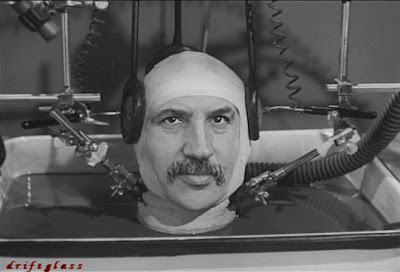
adj \ə-ˈbli-vē-əs\
1: lacking remembrance, memory, or mindful attentionDon't trouble yourself about the content of Tom Friedman's column today: basically, it's what owl pellets would look like an owl (who was also very, very bad writers) had gobbled up, say, this graphic found at Online Masters Degree, or this blog post from the Wall Street Journal, or this column in Slate while watching "Desk Set" (1957)
2: lacking active conscious knowledge or awareness —usually used with of or to
or just leafing through a copy of Kurt Vonnegut's very first novel, published in 1952.
Which is a very long time ago:
"Without regard for the wishes of men, any machines or techniques or forms of organization that can economically replace men do replace men. Replacement is not necessarily bad, but to do it without regard for the wishes of men is lawlessness.
"Without regard for the changes in human life patterns that may result, new machines, new forms of organization, new ways of increasing efficiency, are constantly being introduced. To do this without regard for the effects on life patterns is lawlessness."
Instead, the only thing of any value at all in Mr. Friedman's ramblings is the unintentional solid-gold hilarity of its last paragraph.
The infamously hacktacular Mustache of Understanding (#3 on Salon's "Hack 30")
(When [Tom Friedman is] not jetting around the world on the literally unlimited expense account his money-bleeding newspaper provides him, pondering KFC billboards he spots outside the windows of gleaming office towers in Delhi — or when he’s not lounging beside the pool at his absurd home — the second-most-influential business thinker in the country is worrying about carbon emissions. Which is, I freely admit, a nice change of pace from back when he was telling the world that the invasion and occupation of Iraq would lead to a glorious new dawn of freedom/democracy/whiskey/iPods/Old Navy in the Middle East as a whole.actually concludes his latest weekly 800-word potty training exercise in the "New York Times" as follows:
...)
Indeed, there is no “in” or “out” anymore. In the hyperconnected world, there is only “good” “better” and “best,”
And then, as if his pen were being personally guided by Bollyx, the obscure Roman god of Arrogant Cluelessness, he sums up as follows:
...even good might not cut it anymore and average is definitely over.So "average" is over...but "cosmically craptacular" guarantees you a column for life in the "New York Times"?
You know, in spite of the immensely rich and well-connected Mr. Friedman's protestations to the contrary, it's almost as if there is some kind of Club...


2 comments:
The column's funnier than you let on. He brags about his brilliant insight in 2004 that being connected means we're connected. Events since then, of course, have proven that this brilliant insight is even more brilliant than even the brilliant one could have known.
This is why it's okay he's paid infinite money to write. Only his deep thought can observe the internet and conclude that it leads to connections.
pondering KFC billboards he spots outside the windows of gleaming office towers in Delhi
I've never read anyone who gets quite so orgasmic about advertising billboards, brand names and marketing plans as if they were the Apollo Program, St Peter's Basilica and the Louvre collection combined into one. No wonder such a materialist married a billionaire. Why his banalities have an audience beyond his socially-incestuous country club buddies is beyond me. He's like a sycophantic court scribe the corporatists keep around when they want to hear effusive praise read back to them.
Post a Comment